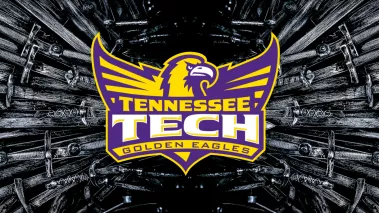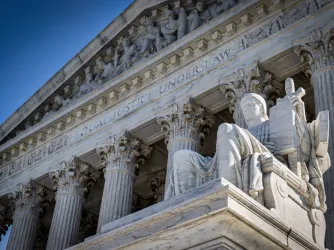Table of Contents
Federal court distorts First Amendment, upholds Tennessee Tech’s punishment of professors for ‘Game of Thrones’ parody flyers

Shutterstock.com
While viewers of HBO’s hit “Game of Thrones” learn to expect brutal endings, two Tennessee Tech professors who sued their university last year to rectify a GOT-related First Amendment violation were hopeful a federal court would hand them a victory.
But last week, in a twist worthy of a season finale, a federal judge for the U.S. District Court for the Middle District of Tennessee flipped the First Amendment on its head to render a puzzling interim victory for the university, holding it could censor the professors . . . to protect free speech?
Fortunately, the professors hinted to Inside Higher Ed that they plan to appeal.
Punished for parody
In February 2021, Tennessee Tech professors Julia Gruber and Andrew Smith created and distributed parody flyers skewering Andrew Donadio, who is a local county commissioner and fellow Tennessee Tech professor. The flyers, showing Donadio sitting on the Iron Throne holding a sword, criticized him as a “racist college professor” for advising the “national hate group” Turning Point USA, because “hate & hypocrisy are not welcome at Tennessee Tech.”

Donadio reported the flyers to the university, but later acknowledged that, as an elected official, he could “take the heat.” Nonetheless, Provost Lori Bruce found Gruber and Smith violated Tennessee Tech’s professionalism policies and, bizarrely, the university’s own Free Speech on Campus policy. She determined it was “a concern” that the professors’ viewpoints supposedly “start to . . . impinge on the rights of other [students], they start mistreating others because of those viewpoints, [and] they start taking actions that are based on those viewpoints that are inappropriate actions.” Bruce believed this “concern” merited discipline despite the fact that the university’s free speech policy clearly forecloses university punishment for merely offensive expression:
Tennessee Tech is committed to maintaining a campus as a marketplace of ideas for all Students and Faculty in which the free exchange of ideas is not to be suppressed because the ideas put forth are thought by some or even most members of Tennessee Tech’s community to be offensive, unwise, immoral, indecent, disagreeable, conservative, liberal, traditional, radical, or wrong-headed.
Punishment followed. The university banned Gruber and Smith from serving as faculty advisors to any student organizations, participating in study abroad activities, and receiving salary increases for a year, among other sanctions.
Refusing to bend the knee, in October 2021 the professors sued, asserting that Tennessee Tech unlawfully retaliated against them for political expression in violation of their First Amendment rights. The professors’ lawsuit echoed FIRE’s August 2021 letter to Tennessee Tech, in which we explained to the university how the First Amendment protects public university faculty when they speak as private citizens on matters of public concern. Among other things, we emphasized that free speech protects parody and satire—even vitriolic, outlandishly offensive mockery—especially in public discussions of issues like racism and public figures like commissioner Donadio.
First Amendment turned upside-down
Chief U.S. District Judge Waverly D. Crenshaw starts promisingly, first establishing the “robust tradition of academic freedom in our nation’s post-secondary schools,” and discussing how “a professor’s rights to academic freedom and freedom of expression are paramount in the academic setting.”
Then things take a turn sideways. Balancing this right against Tennessee Tech’s interest in promoting workplace efficiency, the court validated the university’s “interest in fostering a collegial educational environment while doing everything within its power to maintain its reputation.” The court determined the flyer was “hardly collegial,” and “cuts against the promotion of the ‘free exchange of ideas’” enshrined in Tennessee Tech’s free speech policy.
The free exchange of ideas on campus purportedly valued by Tennessee Tech will shut down if administrators can punish their faculty and student critics.
In discussing how the flyers impacted Tennessee Tech, the court conceded that the university “has shown little in the way of actual harm” given that “Donadio and [TPUSA member] Ms. Sciolis were so unfazed that they went on Fox television.” The court even admitted the “flyer was not seen by many others and there is nothing to suggest that classes at TTU were canceled or rescheduled as a result of the flyer.” Despite this lack of impact, the court upheld the punishment as reasonable because distributing the flyers would allegedly “disrupt its ability to fulfill its core mission of teaching students” and “diminish its obligation to protect all students’ freedom of speech and a free marketplace of ideas.”
This gets the First Amendment completely backwards. Shame. Shame. Shame.

Tennessee Tech punishes professors for flyer parodying Game of Thrones
Tennessee Tech University is seeking to punish two professors for lampooning a local government official.
First, free speech exists precisely to protect uncollegial and insulting expression, as benign, inoffensive words seldom provoke government sanctions. Although universities can address substantial disruption to its activities, the court conceded the flyers caused “little in the way of actual harm.” Troublingly, the court improperly cited a high school student-athlete case to justify university efforts to prevent potential disruption, wholly failing to explain exactly how the flyers could possibly impact campus operations.
Second, and even more disturbing, the court supplanted the professors’ expressive rights to elevate university efforts to “maintain its reputation.” In what world are government agencies allowed to violate citizens’ constitutional rights to bolster their image? How is this a legitimate state interest, let alone one sufficient to override the fundamental freedom to criticize government officials? How many universities will wield reputational concerns as a sword against their faculty’s First Amendment right to criticize administrators?
Finally, the court twisted Tennessee Tech’s commitment to protecting offensive expression to somehow justify suppressing offensive expression. Apparently, it was the flyer that “cuts against the promotion of the ‘free exchange of ideas’” on campus, not the university punishing the professors for distributing the flyer. Perhaps FIRE’s own flyer could help Tennessee Tech understand our point:

Administrators so ignorant of the First Amendment that they see criticism of public figures as stifling free speech pose a far greater chilling effect than parody flyers. The free exchange of ideas on campus purportedly valued by Tennessee Tech will shut down if administrators can punish their faculty and student critics. Turning a policy that claims to protect speech that may be “offensive, unwise, immoral, indecent, [and] disagreeable” into a tool for censorship is a bastardization of First Amendment principles.
Universities will violate faculty rights with impunity if not held accountable by the judiciary. FIRE looks forward to seeing the reversal of this erroneous decision on appeal, and hopes winter is coming for the censors at Tennessee Tech.
FIRE defends the rights of students and faculty members — no matter their views — at public and private universities and colleges in the United States. If you are a student or a faculty member facing investigation or punishment for your speech, submit your case to FIRE today. If you’re a faculty member at a public college or university, call the Faculty Legal Defense Fund 24-hour hotline at 254-500-FLDF (3533). If you’re a college journalist facing censorship or a media law question, call the Student Press Freedom Initiative 24-hour hotline at 717-734-SPFI (7734).
Recent Articles
Get the latest free speech news and analysis from FIRE.

Free speech in Trump 2.0
Podcast

The federal charges against Don Lemon raise serious concerns for press freedom

The American people fact-checked their government


